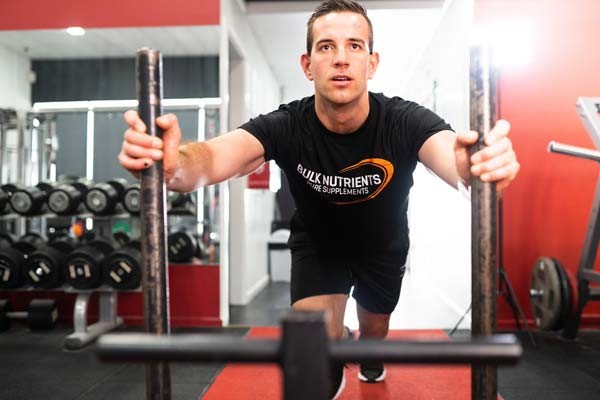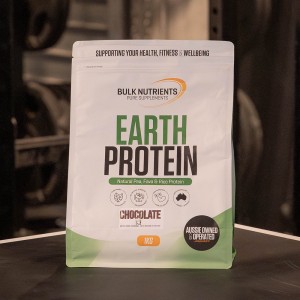How Protein Powder Actually Helps You Lose Weight and Keep It Off

Does Protein Powder Work for Weight Loss?
When it comes to setting up your macronutrient ratio for weight loss, protein is always the highest. This is because:
- It's better than carbohydrates and fat at inducing satiety
- It has just 4 calories per gram compared to fat which has 9
- Your body requires more energy to break protein down and digest it, compared to carbohydrates and fat. In fact, 30% of the calories from protein are lost in the digestion process.
An example of this in action is when Bulk Nutrients customer "Amy" eats 100 calories from a chicken breast. 30 calories from the chicken are lost in the digestion process. This is in comparison to when Amy eats calories from carbohydrates and fat, where the percentage of calories lost in the digestion process are just 5-10% and 0-3% respectively.
Moreover, preserving your hard-fought lean muscle is critical during a diet, and protein is vital for doing that. And perhaps one of the most critical points is that a higher protein intake has been shown to provide better diet satisfaction.
How Protein and protein powder fits into a weight loss diet:
So we know protein is going to keep us fuller for fewer calories, preserve our muscle, and keep us satisfied with our diet. Let's now take a look at Bulk Nutrients customer "Amy" and her weight loss diet:
Protein: 170 grams
Carbohydrates: 100
Fat: 50 grams
How we get to these numbers (administer the correct ratio of macronutrients for a fat loss diet) is beyond the scope of this article. However, you can see protein is the highest because of the initial points made at the start of this article.
In a real-world example, "Amy" would get her protein each day, hypothetically, from sources like chicken, fish, eggs, and meat (assuming she's not a vegan, vegetarian or pescetarian). But the issue with these foods is that they can sometimes contain large amounts of fat and carbohydrates, which makes getting lean protein difficult. For example, salmon and some cuts of meat also contain a substantial amount of fat. If "Amy" has already consumed her daily 50 gram limit of fat then a lean source of protein is optimal. This can come via egg whites, kangaroo or barramundi, but if it's before bed and there's no time to cook then "Amy" still needs to meet her protein number requirements.
You can then see what role protein powder would play in this: it now becomes the perfect and convenient option (that's also low-calorie) for "Amy" and anybody else on a weight loss diet.
Whey protein is also very convenient for during the day when you're on the go, or for breakfast in the morning.
Furthermore, protein powder is an extremely cheap way of consuming protein. Take for example the Bulk Nutrients Whey Protein Concentrate where customers get 33 serves in a 1kg bag. With no cooking required, it's a no brainer when it comes to cost-effective weight loss.

Weight loss supplements: Is Protein powder good quality protein?
Some people question the quality of something that can be cheaper than "real food". But the truth is that whey protein actually has a higher biological value than beef, fish, chicken and other sources of foods! Biological value is a measurement of protein quality, achieved by "calculating the nitrogen used for tissue formation divided by the nitrogen absorbed from food".
Something else to remember about protein powder is that you're unlikely to gain much body fat by consuming it. Coming back to our point that 30% of the calories from protein are lost in the digestion process, and some recent research shocked fitness fanatics around the world. A study was conducted that overfed resistance-trained subjects by 800 calories in the form of whey/casein protein powder. Amazingly, they didn't gain any weight!

This outcome was not only because of the 30% digestion principle of protein but because of the subjects and their high value of NEAT. Neat refers to "non-exercise activity thermogenesis", which is the non-exercise induced calorie burning that happens when we're overfed: maintaining posture, tapping our feet whilst sitting, etc. So when you're really in need of a snack on a weight loss diet, whey protein is your best bet.
In short, whey protein should be part of every successful fat loss diet due to its cost-effectiveness, ability to keep you full without potentially gaining weight, superior protein quality, low-calorie benefits, and power to provide dietary satisfaction; all critical factors in a weight loss diet.
References:
- Soenen S, Westerterp-Plantenga MS. Proteins and satiety: implications for weight management. Curr Opin Clin Nutr Metab Care. 2008;11:747–751. doi: 10.1097/MCO.0b013e328311a8c4.
- National Research Council (US) Committee on Diet and Health. Diet and Health: Implications for Reducing Chronic Disease Risk. Washington (DC): National Academies Press (US); 1989. 6, Calories: Total Macronutrient Intake, Energy Expenditure, and Net Energy Stores.
- van Baak MA. Meal-induced activation of the sympathetic nervous system and its cardiovascular and thermogenic effects in man. Physiol Behav. 2008;94:178–86.
- Westerterp-Plantenga MS, Lemmens SG, Westerterp KR. Dietary protein - its role in satiety, energetics, weight loss and health. Br J Nutr. 2012 Aug;108 Suppl 2:S105-12. doi: 10.1017/S0007114512002589. PMID: 23107521.
- Hoffman JR, Falvo MJ. Protein - Which is Best?. J Sports Sci Med. 2004;3(3):118-130. Published 2004 Sep 1.
- Antonio J, Peacock CA, Ellerbroek A, Fromhoff B, Silver T. The effects of consuming a high protein diet (4.4 g/kg/d) on body composition in resistance-trained individuals. J Int Soc Sports Nutr. 2014 May 12;11:19. doi: 10.1186/1550-2783-11-19. PMID: 24834017; PMCID: PMC4022420.















































